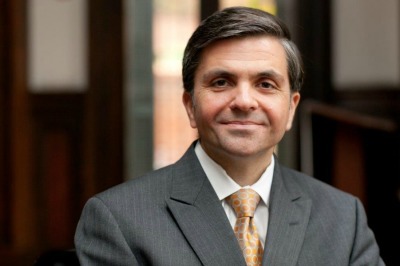Iran's Spiritual Challenge to American Christians

Nine years ago liberal American religious activists like pacifist Jim Wallis of Sojourners created a "Words, Not War, With Iran" coalition to organize against decisive U.S. action against Iran's nuclear program. Revealingly they urged:
We believe that the U.S. and other nuclear weapons states would be in a stronger position to prevent the spread of nuclear weapons if they took the necessary steps toward eliminating their own nuclear arsenals—which our signing of the Nuclear Non-Proliferation Treaty commits us to but is a promise yet to be fulfilled.
So from their perspective, a disarmed America would be morally and even politically more effective in persuading Iran and others not to nuclearize. For them, global statecraft is, or should be, about showcasing a moral example and expecting the rest of the world to follow, even the Shiite theocrats that have reigned over Iran for 36 murderous years.
Eight years ago, in a similar spirit, the National Council of Churches took a delegation of U.S. denominational officials to meet with then Iranian President Mahmoud Ahmadinejad, whom they evidently found to be quite receptive. In their subsequent statement, the church prelates surmised:
We believe it is possible for further dialogue and that there can be a new day in U.S.-Iranian relations. The Iranian government has already built a bridge toward the American people by inviting our delegation to come to Iran. We ask the U.S. government to welcome a similar delegation of Iranian religious leaders to the United States.
And as "additional steps in building bridges between our nations," the prelates urged both the U.S. and Iranian governments to: "immediately engage in direct, face-to-face talks; cease using language that defines the other using 'enemy' images; and promote more people-to-people exchanges including religious leaders, members of Parliament/Congress, and civil society."
As such ill-considered initiatives reveal, there's a longstanding tradition of confidence among American religious communities, and not just liberals, that conversation and good will can surmount all obstacles, both in personal relations and internationally among states, even Iran's regime of mullahs.
Such geostrategic wishfulness is not limited to ecclesial arenas but sometimes emanates upward through American governance. Iran's theocratic revolution overthrew a pro-American monarchy that had presided over unprecedented prosperity and progressive social reforms. The Shah's regime sometimes incarcerated and occasionally executed its opponents, especially from the pro-Soviet Tudeh Party, which incited critiques from critics in the West. But it was his perceived secularism and legal protections for women and non-Muslims that more motivated Islamist opponents like the Ayatollah Khomeini, who became the public voice of opposition from his French exile.
Although President Carter, during his famous 1977 New Year's Eve visit to Iran, praised the Shah as an island of stability, his administration was ambivalent about the Shah's regime. The Carter Administration haphazardly made human rights a policy focus in ways that undermined pro-Western rightist regimes while ultimately empowering more repressive anti-Western regimes and revolutionary movements, like Khomeini's.
Carter was and is a devout Baptist of liberal bent who heeded the then still-influential liberal Protestant political witness of groups like the National Council of Churches. He and they undervalued the importance of military strength, were mystified by ruthless ideologies impervious to personal diplomacy, and often assumed the U.S. and West were themselves guilty of historic misdeeds that made robust critique of adversarial regimes morally problematic.
These same ultimately religiously infused assumptions arguably pervade the current administration. President Obama is, like Carter, a liberal Protestant, if not as church going, and shaped by the theology of famously incendiary Rev. Jeremiah Wright, a United Church of Christ cleric recalled for his imprecatory "God damn America" sermon. Both presidents are repentantly shaped by the memory of the CIA's much over-hyped role in the Shah's counter coup and return to power in 1953, with support then from clerics like Khomeini, over concerns about Marxism.
Iran's theocracy has executed and otherwise murdered many tens if not hundreds of thousands, exponentially greater than the perhaps several thousand who perished under the Shah's four decades. But American liberals, with religiously inspired notions of American guilt, are often more focused on U.S. complicity in the Shah's misdeeds than in the mullahs' barbarities and wider strategic threat.
The Iranian Revolution of 1979 sweepingly styled itself history's third great revolution after the French and Bolshevik. Like those blood-drenched historic seismic shifts, the mullahs and their supportive zealots see themselves cosmically and, unlike the two atheist revolutions, transcendently. Iran's theocrats are totalitarian, absolutist and defined by their hatred of Jewish- and Christian-shaped Western Civilization. Like the early French revolutionaries and Bolsheviks, they see the world aligned against them, and any pretense of diplomatic compromise is a temporary contrivance for larger political gains.
Of course, Iran's theocrats, with confidence in their place in an eternal paradise, are potentially far more reckless than secular totalitarian revolutionaries. Hence their potential acquisition of nuclear weapons is more alarming than acquisition by other brutal but less spiritually ambitious regimes, like North Korea.
Understanding the full breadth of geopolitical threat posed by nuclearized Iranian mullahs with visions of their own central role in the End Times, not to mention more temporal dominance of the Mideast, requires a spiritual and strategic discernment very difficult for utopian and guilt ridden American religious idealists and others guided by their perspective, however unconsciously.
Theologically Orthodox Church leaders and thinkers not beholden to utopian and anti-Western ideology are not vocationed for detailed U.S. foreign policy guidance. But they are summoned to offer the spiritual framework for both understanding the threat and crafting stalwart action against theocratic Iran's nuclear and ultimately genocidal ambitions.
Many American Christians today are justifiably focused on the crimes of ISIS. But they do well to consider the less publicized, but far more menacing regime to the north.
This article originally appeared on Philos Project.



























